Larry Clark sits on a sofa in his artifact-cluttered Midtown house, leafing through a slender book of old photographs. “What a wild life,” he says, under his breath, thumbing past images that remind him of that time he pulled a squad of Russian showgirls from the wreckage of a derailed circus train. And of the time he pulled a man who dressed like Little Lord Fauntleroy from the wreckage of a derailed circus train. Not to mention the time he juggled fire and chainsaws on tour with Marilyn Manson and Nine Inch Nails.
“I’ve been so lucky,” Clark says, showing a picture of himself as a happy teenager, wearing a bright yellow costume topped with an even brighter orange wig. “I’ve been able to do everything I ever wanted to do.”
Some little boys want to drive fire trucks when they grow up. Some want to be doctors or inventors or pilots or businessmen. Some even want to be president of the United States. Larry Clark never wanted to be anything but a clown.
And he pursued that dream relentlessly. “It was an obsession,” he says. From the time he was a toddler, he’d cry when a circus performance ended and his parents got up to go home. “I never wanted to leave the circus,” he says. “I always pleaded with my parents to take me back.”
It’s been a tough few months for Clark, who also performs as a comedian, juggler, mentalist, magician, and storyteller. First, he lost his grandfather in November. Shortly thereafter, his father died unexpectedly. He had to postpone a one-man show he’d been preparing to open at the end of January, and, just when it seemed like things could only get better, they got worse. Ringling Bros. Barnum & Bailey Circus, an American institution older than Coca-Cola — older than baseball — announced it would shut down forever in May. While it was sad news for circus fans, it was devastating news for Clark, who’s worked on and off with the famous troupe for years, even performing as the company’s host clown.
“Name another American brand that’s survived every world war,” Clark says. “[The circus] survived recession, the Great Depression. It survived more slings and arrows than you can ever imagine.
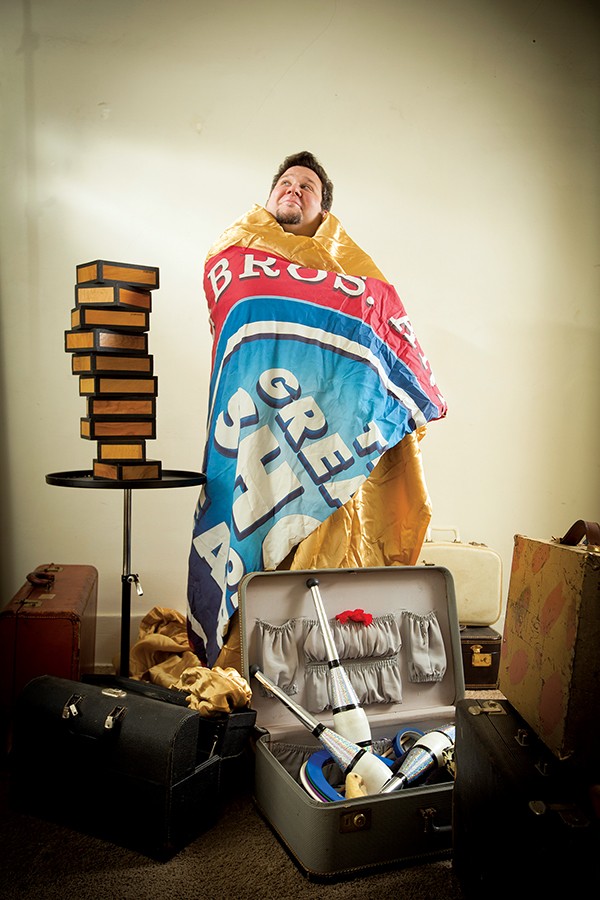
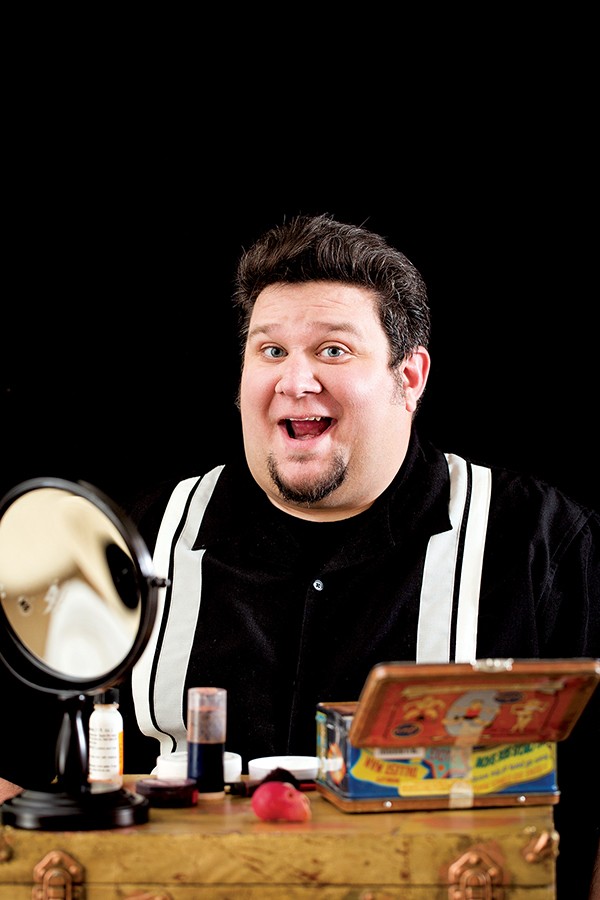
“But the circus isn’t dead just because Ringling Bros. is shutting down,” Clark adds. “That just means a show with 400 people per unit, 18 lions, and two human cannonballs can’t survive in this climate. People still love going to circuses, and there are dozens of tented American circuses that are still doing very well. I’m sure Ringling Bros. could have cut the overhead and kept things going too, if they’d wanted to. They could have pared things down. But then it wouldn’t be the Greatest Show on Earth, would it?”
Clark, who’s a collector of “marvels” and a scholarly champion of the variety arts, mourns the loss of Ringling Bros., but he’s not worried about his own future. “I’ll work, like I always have,” he says.
Through the years, he’s taken Shrine Circus gigs, worked for theme parks and carnivals, and performed with Cirque du Soleil. He’s seen American circus arts evolve, grow, and splinter off in dozens of directions. He’s also played his own small part in the resurrection of previously “dead” forms such as the ten-in-one sideshow and baggy-pants burlesque.
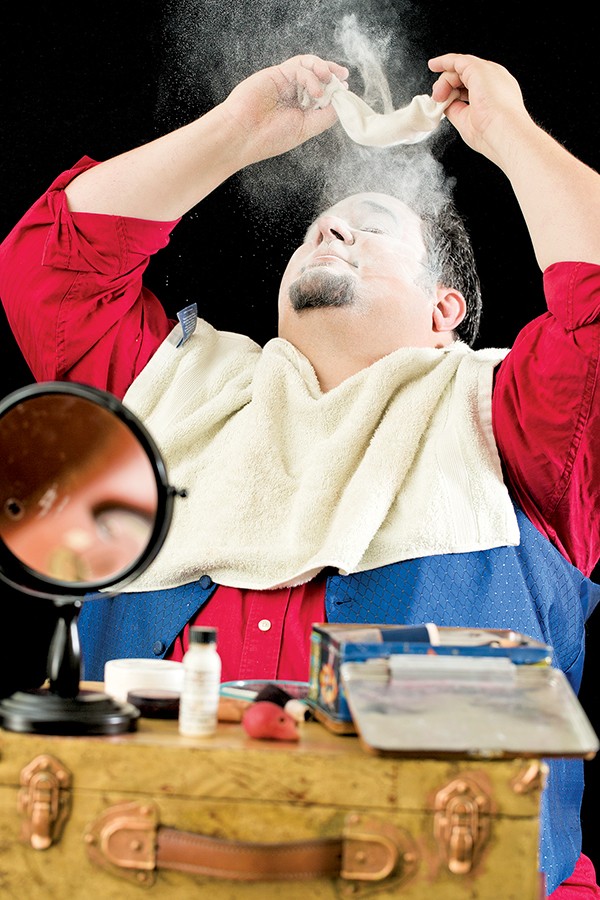
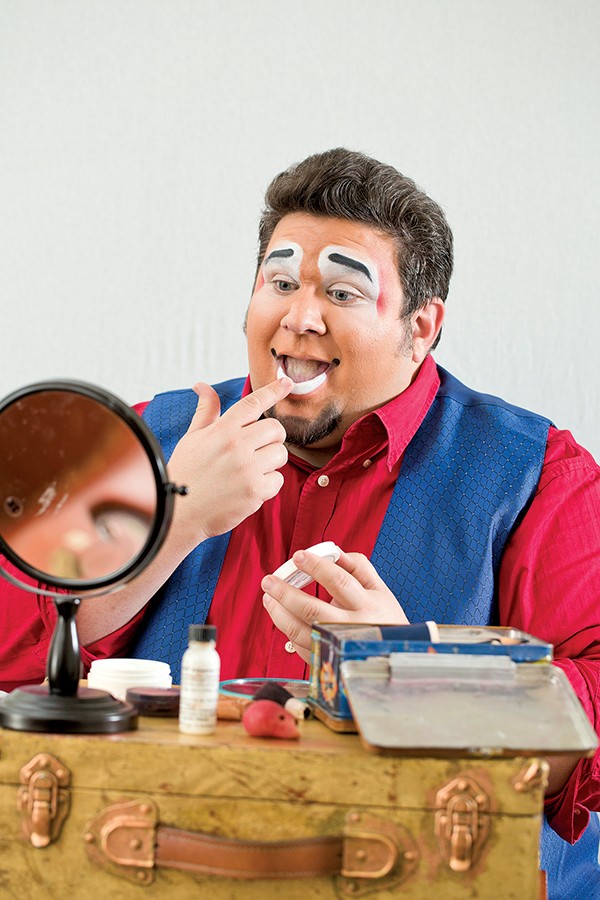
“All the books I’ve ever read about being an entertainer say a good clown learns how to do everything, not just how to be funny,” he says. “So I juggle, do magic, and I even play some musical instruments.” He also drives nails up his nose and swallows scary things like lightbulbs, and fire, and swords. “I don’t like swallowing swords,” he says.
Clark decided he wanted to be a clown early on. “You know, in kindergarten, how they make you lie down on a big piece of paper so they can draw your outline, then ask you to color in who you want to be? I already had my makeup designed. Only I gave myself a big scary jack-o-lantern smile because I was five.”
Most artists spend at least some portion of their early years working day jobs to get by. Clark rarely took that kind of gig, and the ones he did take never lasted long. He’d eventually get fired for calling in sick to take freelance clown work or to catch a show when a circus was in town. That worried his parents, but by the time he was 12, Clark was already doing magic and making decent money working birthday parties, store openings, and other events.
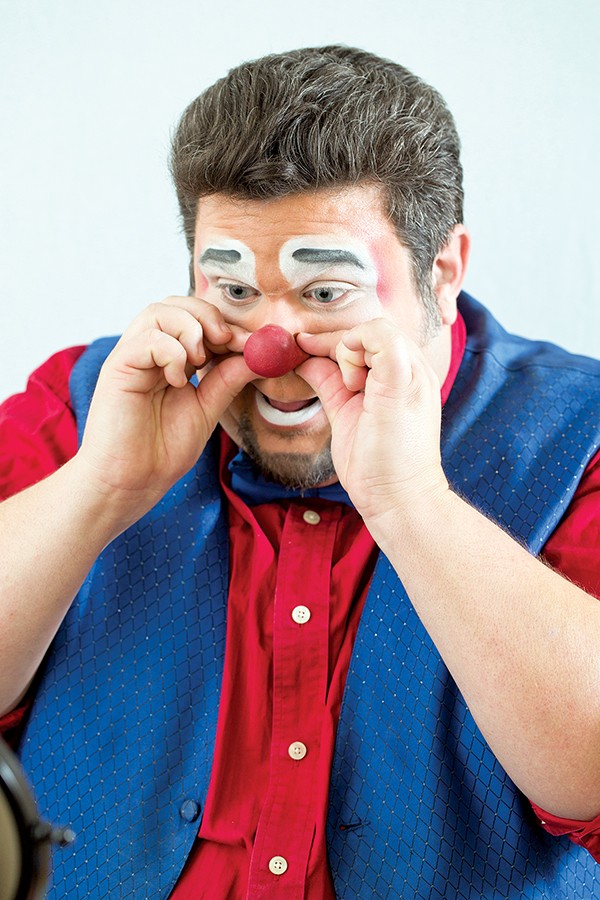
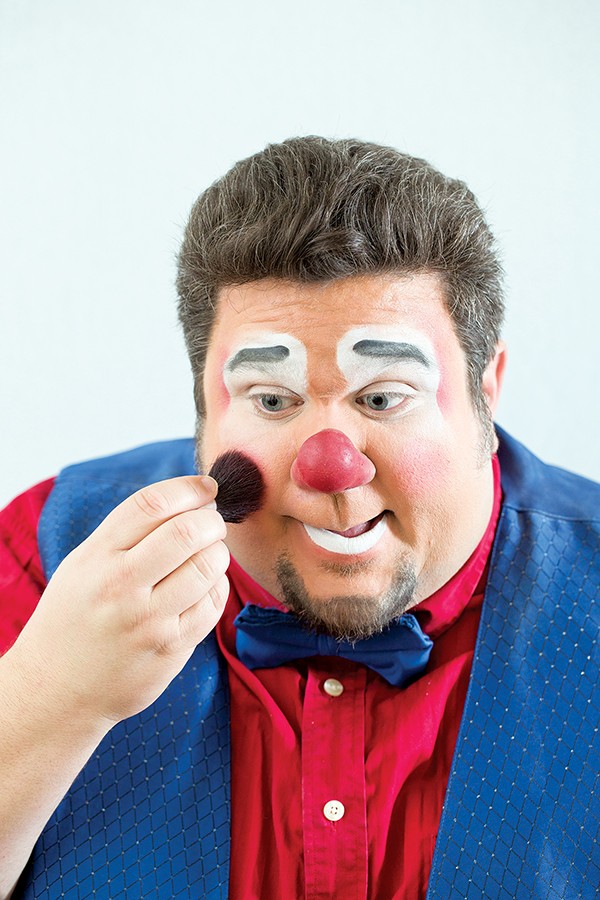
“There was one time when my dad decided I didn’t understand the value of hard work and money, and that was probably true,” he says. To remedy the situation, Clark was forced to apply for a job at the neighborhood Kroger on Mendenhall and instructed to take whatever job they offered. But Clark’s career as a bag boy ended on the same day it began — because no true clown can bear the sight of a crying child, particularly one wailing while his mom is in the checkout line. Reflexively, Clark snatched up a shopping cart and balanced it on his face. The child stopped crying and started laughing. The mother thanked him for accomplishing what she couldn’t. Unfortunately, the manager, who had no patience for clowning, fired Clark on the spot, sending him back to his chosen career path.
Clark spent countless days in the old main branch of the Memphis Public Library on Peabody. “It sounds cheesy to say, but I learned so much in the public library,” Clark says. He studied books on clowning, magic, and circus arts. He spent so much time pursuing his interests, he sometimes fell behind on his schoolwork.
“I hated school,” Clark admits, although he did attempt one semester at the University of Memphis, where he failed every class but juggling. Who had time for college when Wolfchase Galleria was hiring performers for its grand opening, and he could make enough cash from that gig take all his newly minted college buddies to Destin for Spring Break? “I’ve never been very good with money,” Clark also admits.
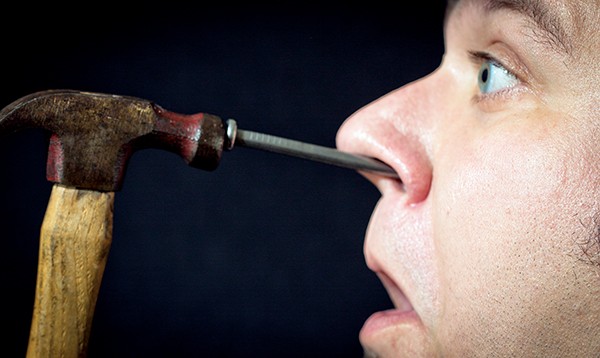
There’s a thread of loss running through Clark’s backstory. Libertyland, the place where he cut his teeth as a precocious teenage clown, closed down in 2005. “It closed for all the wrong reasons,” he laments. “Even in its last year, there were 200,000 visitors to the park. There were problems, but that’s not a failing business.”
Mr. Giggles Jungle Adventure was the name of the show Clark performed in at Libertyland. He played a character named “Larry, Lord of the Apes” and used his circus skills to teach the show’s serious title character how to laugh. Recent Nobel laureate Bob Dylan bought out the whole park and enjoyed a private performance one night while he was in town for a concert. Vegas lounge singer Tom Jones tracked Clark down one day to pay his compliments, after watching the young clown sing Jones’ signature tune, “What’s New Pussycat,” to a couple of actors in lion costumes.
Working at Libertyland gave Clark a chance to develop his skills in front of an audience. “It was a great little theme park,” Clark says. “The shows were fantastic, it employed a lot of young people, and it was headquartered in Memphis. It was ours.”
Not only did Clark go see every circus that came to town, he started going early to see how the shows were set up and staying late to see how they were broken down. Naturally gregarious, he’d volunteer to help and was never shy about asking the clowns and old side show performers to share a few tricks of the trade.
In the absence of any real formal training, Clark tried his hand at everything. He did street performance on the Boardwalk in Atlantic City, New Jersey, where he also worked the “Wheel of Death” in daredevil shows for a family troupe called the Nerveless Nocks. He tried his hand (and face) at wince-inducing sideshow tricks with the Jim Rose Circus sideshow. Rose’s show became the face of modern freakdom in the 1990s when his company performed on the Lollapalooza tour. After Clark stretched the truth a bit and said he could juggle chainsaws, Rose was intrigued and invited him to join the show, forcing Clark to have to quickly figure out how to juggle chainsaws — and he did.
“We’d perform in bars and smaller venues during the week,” Clark, said. In between juggling chainsaws, Clark paid close attention to his fellow performers and absorbed newer — and weirder — skills like a sponge. On weekends, the company went out on the road with alt-rockers Marilyn Manson and Nine Inch Nails. It was an eye-opening experience for Clark who says he “learned a lot really fast.”
Clark dreamed of attending clown college, but Ringling Bros. shut it down in 1997. By that time, Clark was wearing his red nose for Royal Palace, a small Hungarian circus working mid-sized venues up and down the East Coast. His big break blew in with a hurricane that threatened to pummel Florida in 1998.
“All of Florida was supposed to shut down,” Clark says. “The Royal Palace was supposed to play a show in Daytona when word got out that Disney was shutting down. We figured they must know something we didn’t.”
When Daytona cancelled, Clark went to Orlando to ride out the storm with his friends Wayne and Marty Scott, circus historians and purveyors of fine clown shoes. Only the hurricane never made landfall, and the next morning brought a surprise phone call from Ringling Bros. recruiter, Tim Holst, a modern-day Robert Ripley who traveled the world looking for marvels and oddities. Holst was looking for experienced clowns, knew of Clark’s work, and made him an offer to become the first non-clown-college graduate to work for Ringling Bros. in 40 years.
Clark describes his years clowning, hosting, and doing advance work for Greatest Show on Earth as some of the best of his life. “It’s like, what do you do after you’ve won an Olympic medal?” he asks. “Go become a greeter at Walmart?”
But Clark’s seen plenty of hard luck, and he can tell plenty of tales wherein everything goes sideways and everybody loses their money and ends with a twist nobody could have seen coming.
For example … Clark describes his last days with Circus Nation, one of the most talent-stacked shows he’s ever hooked up with. “It was really too much circus,” he says. “We were all owed money.”
There were already ownership problems when a week’s delay in Laredo, Texas, and ongoing hurricane threats (again) resulted in more cancelled shows. Eventually, like a scene from a John Irving novel, it ended with a bunch of broke circus people standing around on the side of the road, looking at the show’s parked trucks, wondering what they were going to do next.
Clark had just enough cash to limp into Dallas, check into a hotel room, and start getting his life back together. That’s more or less the story of how Larry the teenage clown from Libertyland came to own and operate his own circus.
Clark had been the spokesperson for Circus Nation. When the call center selling tickets for booked shows didn’t hear back from management, they called him. “I told them I didn’t know anything and was owed money,” Clark says. But when the ticket company couldn’t book a replacement crew to work a Shrine Circus date, they called Clark again and asked if he might produce a show. “So I called some of my friends,” he says.
Not only did the show go well, it resulted in other Shrine Circuses hiring Clark to assemble their shows. “I’ve worked so hard all my life to not be in charge of anything,” he laughs. “Now I’m a producer.”
Memphis has a lot of circus history. In addition to hosting its own companies, the city was also a popular port for one-ring circuses touring the Mississippi River on riverboats. Ringling Bros. opened the Mid-South Coliseum in 1954 and played there frequently. After the Pyramid opened in 1991, its famous circus train — the largest privately owned train in the world — rolled into the Pinch District every 4th of July weekend.
The Greatest Show on Earth may be going away for good, but a man who was a part of it still calls Shelby County home, and he likes to perform here whenever he can. “I’ve had the opportunity to visit a lot of places,” Clark says. “And Memphis is a good place to be.”
In addition to his clowning, Clark’s also an accomplished burlesque show host. He’s performed with local improv groups such as the Wiseguys and the now-defunct Freak Engine. His infrequent one-man shows at venues such as TheatreWorks and the Brass Door downtown sell out faster than you can say, “That’s all, folks.”
“People love the circus,” Clark insists, still flipping past images of clowns, aerialists, daredevils, freaks, and geeks. “The circus isn’t going anywhere.” And neither is he.
So keep an eye out, Memphis. You never know when you might catch Larry Clark, a genuine local treasure, working out the kinks for his latest stand-up routine or clowning around at a street festival. Life is funny that way.